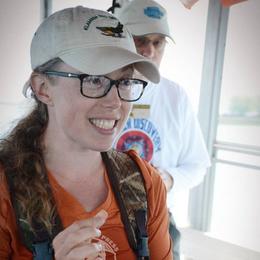January 22, 2020
We are huge fans of our feathered friends for their beautiful diversity, birdsong, the ecosystem services they provide, and their ability to tell us about the health of our lands and waters. Each season brings with it a new band of birds, giving us continued opportunities to connect with nature year-round wherever we are. While winter can be cold and dreary, areas of open water within Michigan's lakes and rivers turn into a cornucopia of waterfowl and water bird activity! Woodlands and grasslands that provide winter cover and seeds for birds are home to overwintering Dark-eyed Juncos, White-throated Sparrows, and American Tree Sparrows, which can also be found at your winter bird feeders.
With bird populations in decline since the 1960's, it is increasingly important that scientists and land managers understand all aspects of a birds life cycle, and migration and winter-long monitoring efforts are on the rise. Winter bird counts help scientists better understand winter bird movements, assess winter bird population health, and guide meaningful conservation action. We need your help to ensure these important data are collected!
Check out all of the great upcoming community science opportunities hosted by MI Birds partners across the state, and find out how you can get involved:
Michigan Winter Feeder Watch with Kalamazoo Nature Center (November – April): Help our partners study Michigan birds this winter! Do you have a birdfeeder visible from a window in your home or at your office? If so, you are perfectly equipped to participate in Kalamazoo Nature Center’s Annual Winter Feeder Survey. From November through April, they ask Michigan community members to submit monthly information about birds they observe at their bird feeders, using a simple protocol. FeederWatch information is incredibly valuable for the protection and conservation of birds in Michigan. This important survey cannot be done without the help of community scientists! Register to volunteer here!
Detroit Audubon and Birds Canada Winter Waterfowl Count (January 25th, February 8th, and Feb 29th)! The Detroit River is a globally recognized Important Bird Area, known for its outstanding migrant and wintering waterfowl and waterbird concentrations. Early winter surveys have recorded nearly 80,000 Canvasbacks, over 1,900 Tundra Swans, 1,000 American Black Ducks, 10,000 Mallards, and 3,500 Common Mergansers! This international count is done by community scientists on both sides of the border, in the U.S. and Canada. Contact Detroit Audubon’s Research Coordinator, Ava Landgraf, for more information on how you can help: alandgraf@detroitaudubon.org
Climate Watch (Jan 15 – Feb 15): This Audubon bird count occurs each winter and summer (May 15 - June 15). Climate Watch provides scientists with data on the current distribution of target species, such as the Eastern Bluebird, White-breasted Nuthatch, and Red-breasted Nuthatch. The data can then be used to validate and refine Audubon’s climate models that help to predict species range shifts under the effects of climate change. The results from the survey will allow scientists to identify areas of high climatic suitability for target species and to inform on-the-ground land management decisions. Contact one of the following Climate Watch Coordinators in MI to learn how and where you can participate: Becky Kuhn (Grand Rapids Audubon Club): bexrecky@gmail.com, or Erin Rowan (MI Birds) at erin.rowan@audubon.org.
The Great Backyard Bird Count (February 14-17): This 4-day event coordinated by Audubon and the Cornell Lab of Ornithology invites people all over the world to record their bird observations for at least 15 minutes, in your own backyard or at public lands near you! All ages and birding levels are welcome and you can participate in any or all of the four days of this international birding event. Last year, over 210,000 people participated in this global bird count! Learn how to participate in this winter community science bird count, here. MI Birds is hosting a count on Belle Isle State Park on Feb 15th. Register here!
Project FeederWatch (November - April): This project is organized by Cornell Lab of Ornithology and Birds Canada and runs from November through April! All age levels and birding skills are welcome! Interested in participating? Here’s what you need to know!
- You can monitor your bird feeder as frequently or infrequently as you’d like; you create your schedule!
- Materials you will need: bird feeder, bird bath or bird-enticing plants.
- There is an annual participation fee of $15 for members or $18 for non-members, which goes towards materials (your research Kit, which they will send you), staff support, web design, data analysis and their year-end report.
- Your Research Kit will include a welcome letter, a FeederWatch Handbook and Instructions, a full-color poster of common feeder birds, and a bird watching calendar to help you track your FeederWatch days.
To participate in FeederWatch, register here.
This is a friendly reminder that baiting and feeding bans are still in place in the Lower Peninsula in an effort to prevent deer gathering around a food source, which increases the potential spread of Chronic Wasting Disease (CWD). We encourage you to use tube, hopper, and suet bird feeders rather than putting seed directly on the ground or using platform feeders, which tend to attract deer and other unwanted guests. In addition, mess-free bird seed options are available to purchase at stores, which can help keep the ground clean. You can also prevent deer from accessing your feeders by fencing in your feeders, if possible. For more bird feeding tips, visit MI DNR's website.
If you have any questions or concerns about the feeding and baiting regulations, please contact your local DNR Customer Service Center.
MI Birds is a public outreach and engagement program created by Audubon Great Lakes and Michigan Department of Natural Resources which aims to increase all Michiganders engagement in the understanding, care, and stewardship of public lands that are important for birds and local communities.







